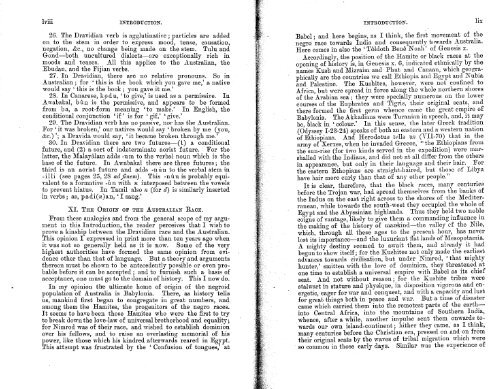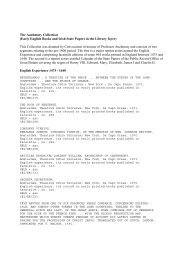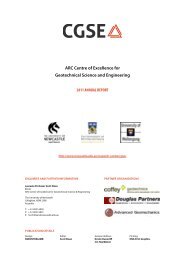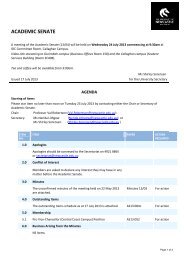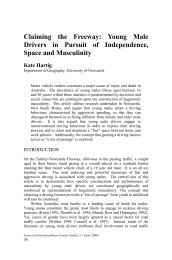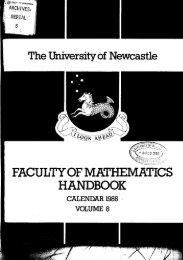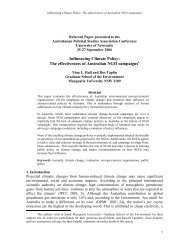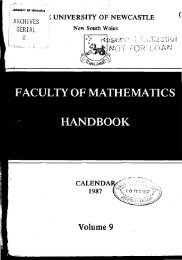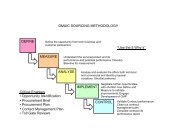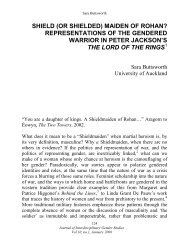n - University of Newcastle
n - University of Newcastle
n - University of Newcastle
You also want an ePaper? Increase the reach of your titles
YUMPU automatically turns print PDFs into web optimized ePapers that Google loves.
lviii MTRODUCTION. INTRODUCTION. lix<br />
26. The Dravidian verb is agglutinative ; particles are added<br />
on to the stem in order to espress mood, tense, causation,<br />
negation, kc., no change being made on the stem. Tulu and<br />
Gond-both uncultured dialects-are exceptionally rich in<br />
moods and tenses. All this applies to the dustralian, the<br />
Ebudau, a~ld the Fijian verbs.<br />
27. I11 Dravidian, there are no relative pronouns. So in<br />
Australian ; for ' this is the boolc rrhich you gave me,' a native<br />
mould say ' this is the book ; yon gave it me.'<br />
28. I11 Canarese, liodu, 'to give,' is used as a permissire. In<br />
Awabakal, bkn is the permissive, and appears to be formed<br />
from ba, a root-form meaning 'to make.' In English, the<br />
conditiouai coiljunction ' if ' is for ' gif,' ' give.'<br />
29. The Dravidian verb has no passive, nor has the Australian.<br />
For 'it was brolren,' our natives mould say ' brolien by me (you,<br />
613.) '; a Dravida ~ould say, 'it became broken through me.'<br />
30. I11 Dra~idian there are two futures-(1) a conditioilal<br />
future, and (2) a sort <strong>of</strong> indeteimlinate aorist future. For the<br />
latter, the llalayiilanl adds -um to tlle verbal noun which is the<br />
base <strong>of</strong> the future. I11 An~abaksl there are three futures ; the<br />
shird is an aorist future and adds -nun to the verbal stem in<br />
-illi (see pages 23, 28 ad9nena). This -niin is probably equi-<br />
valent to a formative -kn with 1, interposed between the vowels<br />
to prevent hiatus. In Tamil also IL (for d) is similarly inserted<br />
in rerbs ; as, p adi(?z)an, ' I sang.'<br />
XI. THE ORIGIN OF THE AUSTB-~LIAN RACE.<br />
From these analogies and from the general scope <strong>of</strong> my argument<br />
ill this Introduction, the reader perceives that I wish to<br />
prove a kinship betmeell the Dravidian race and the Australian.<br />
This opinion I expressed in print more thau tell years ago when<br />
it was not so generally held as it is now. Some <strong>of</strong> the very<br />
highest authorities hare formed the same opinion from evidence<br />
other than that <strong>of</strong> language. But a theory and arguments<br />
thereoil illust be shown to be antecedently possible or even probable<br />
before it call be accepted ; and to furnish such a basis <strong>of</strong><br />
acceptance, one must go to the domain <strong>of</strong> history. This I now do.<br />
In my opiuion the ultimate home <strong>of</strong> origiil <strong>of</strong> the negroid<br />
population <strong>of</strong> Australia is Babylonia. There, as history tells<br />
us, mankind first began to congregate in great numbers, and<br />
among them the Hamites, the progenitors <strong>of</strong> the negro races.<br />
It seems to have been those Hamites who were the first to try<br />
to break domnthe lore-law <strong>of</strong> universal brotherhood and equality;<br />
for Nimrod was <strong>of</strong> their race, and wished to establish dominion<br />
over his fellows, and to raise an everlasting memorial <strong>of</strong> his<br />
power, like those which his kindred afterwards reared in Egypt.<br />
This attempt was hustrated by the ' Confusion <strong>of</strong> tongues,' at<br />
Babel ; and here begins, as I think, the first ulovement <strong>of</strong> the<br />
negro race towards India and consequeiltly towards Australia.<br />
Here comes in also the ' Taldoth Ben& Koah' <strong>of</strong> Genesis s.<br />
Accordingly, the positioil <strong>of</strong> the Hamite or black races at the<br />
opening <strong>of</strong> history is, in Genesis I;. G, iiidlcnted ethnically by the<br />
names Kush and Mizraim and Phut and Canaan, nhich geogra-<br />
phically are the countries we call Ethiopia and Egxpt and Kubia<br />
and Palestine. The Iiushites, hon ever, I\ ere not confined to<br />
Africa, but were spread in force along the nhole northern shores<br />
<strong>of</strong> the Arabiau Bea ; they mere speciallj- numerous on the lo\\-er<br />
courses <strong>of</strong> the Euphrates and Tigris, their origical seats, and<br />
there formed the first germ mhellce came the great empire <strong>of</strong><br />
Babylonia. The Aliliadians were Tnranian in speech, and, it may<br />
be, black in ' colour.' I11 this sense, the later Greeli tradition<br />
(Odyssey 1-23-24!) speaks <strong>of</strong> both an eastcru and a western nation<br />
<strong>of</strong> Ethiopians. And Herodotus tells us (1-11-70) that ia the<br />
army <strong>of</strong> Xerxes, d en he invaded Greece, '. the Ethiopians from<br />
the sun-nse (for two kinds serrecl in the expedition) were mar-<br />
shalled with the Indiaiis, an? clicl not at all differ from the others<br />
in appearance, but only in their laugua~e and their hair. For<br />
the eastern Ethopians are stmight-haired, but tl~ose <strong>of</strong> Libya<br />
hare hair more curly than that <strong>of</strong> any other people."<br />
It is clear, therefore, that the blacli races, maup centuries<br />
before the Trojan war, had spread themselres from the banks <strong>of</strong><br />
the Indus on the east right across to the shores <strong>of</strong> the Mediterranean,<br />
while towards the south-vest they occupied the nhole <strong>of</strong><br />
Egpt and the Abyssinian highlands. Thus they held two noble<br />
colglls <strong>of</strong> vantage, likely to give them a commanding influence in<br />
the makiilg <strong>of</strong> the history <strong>of</strong> ma&i~~d--the \-alley cf the Nlle,<br />
which, through all these ages to the preseilt hour, has never<br />
lost its importance-and the luxuriant flat lands <strong>of</strong> lIesopotamia.<br />
A mighty destiny beemed to a~rait tlie~ll, and already it had<br />
begun to show itself; for the Iiuehites not only made the earliest<br />
advances tonrards civilisation, but under Slmrod, ' that mighty<br />
hunter,' smitten with the love <strong>of</strong> dominion, they threatened at<br />
one time to establish a universal e11:pire with Babel as its chief<br />
seat. And not without reason; for the Icushite tribes nere<br />
stalwart in stature and physique, in clisposition vigorous and energetic,<br />
eager for n-ar aid conquest, and nith a capacity and lust<br />
for great things both in peace and nar. But a time <strong>of</strong> disaster<br />
came which carried them into the remotest parts <strong>of</strong> the earthinto<br />
Central Africa, into the mountains <strong>of</strong> Southern India,<br />
whence, after a while, another impulse sent them onwards towards<br />
our own island-continent; hlther they came, as I think,<br />
many centuries before the Christiau era, pressed on and on from<br />
their original seats by the wares <strong>of</strong> tribal migration ~rhich were<br />
so common in those early days. Su~~ilar mas the experience <strong>of</strong>


